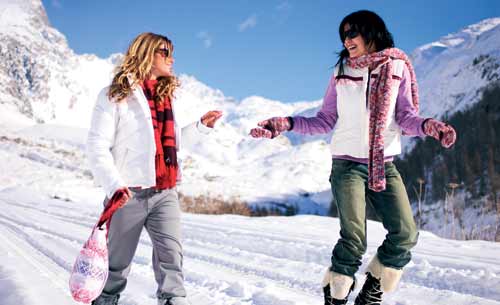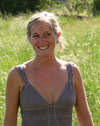Words: Poppy Smith
Without a doubt, doing a winter in the mountains will be one of the best experiences of your life. Five months of riding every day, partying like mad, never missing a powder day and making friends for life are guaranteed, but don’t be fooled into thinking it’s an easy ride. Early mornings, late nights, six day weeks, 15 hour days, low pay and no time to yourself are all part of the fun. If you think you can handle it, then read on.
WHERE TO GO
When choosing where to do your season, there are several factors to take into account. Firstly, do you want to be in Europe or further a field like America, Canada or Japan? Are you a beginner or intermediate rider? What type of riding do you want – freestyle queen or a park junkie? And what sort of resort do you want to be in – quaint village or buzzing town?
If you want good all-round riding and don’t want the hassle of sorting out a work permit, Europe is the obvious choice. France is the easiest place to get work in the European Alps because of the amount of big resorts, but the Austrian friendliness, cheap beer of Andorra and immaculate Italian resorts shouldn’t be overlooked. Unless you want to be a rep you don’t need to speak the language. A grasp of the basics will help, but as long as you can speak English you’ll be fine.

In France there are tons of great places to do a season. If you’re a beginner or intermediate rider, head for a good all-round resort like Val d’Isere with it’s vast Espace Killy ski area and great winter comps like the Xbox Big Day Out and Premiere Neige, the first downhill ski race of the season. Meribel is also a popular place to do seasons, and is slap bang in the middle of the massive Trois Vallees ski region with something for everyone.
If you’re a freestyle queen with a bit of experience, head to Chamonix where the backcountry is amazing, and if you want to hang with the pros, Morzine has been their second home for the last few years due to the good parks and expanse of the Portes du Soleil ski area. Next door to Val d’Isere is Tignes, known as the rider’s resort. More continental than other French resorts, it’s a bit of a concrete jungle, but people who do seasons in Tignes always seem to go back there.
If you’re a freestyle queen with a bit of experience, head to Chamonix.
The only down side to working in a French ski resort is that the cost of living is quite high. But if you’re working in a chalet where all your food and accommodation covered, it shouldn’t affect you too much.
The Swiss Alps are also a great place to go with resorts to suit every ability. Arosa, where the Swiss go, is a good all-rounder with groomed pistes and untracked off-piste. Popular Verbier is great for backcountry and Laax has a super pipe, so tons of great comps like the Orange British Ski and Snowboard Championships and the Burton European Open are held here. But like France, Switzerland can be expensive so find work that includes food, accommodation, lift pass etc before you get to the resort.
Mayrhofen in Austria is another extremely popular place for working a ski season, and its glaciers mean that you can stay all summer if you want to. The cost of living is relatively low so your wages will go further than in France or Switzerland and it has a great social scene, which is good if you’re doing a season on your own.
Italy, Andorra and Spain aren’t such obvious destinations as the ski areas aren’t on the same scale as France and Switzerland, but don’t rule them out. They’re a good place for beginners, with lively nightlife and are very cheap in comparison.
Work out what’s most important – partying, riding or money.
It doesn’t all begin and end in Europe; Canada and America have some of the best snow, parks, pipes, backcountry and heliskiing in the world, with impeccably-groomed pistes, ordered lift queues (unlike Europe) and excellent service. Resorts like Whistler, Vail and Mammoth are all world-class places to spend a winter. But getting work is a whole different ball game as you’ll need a visa to work there.
If you go to Canada as part of your Gap year, then contact BUNAC (www.bunac.org.uk) who will help you sort out your visa, or contact the Canadian Immigration (www.cic.gc.ca). For visas for the USA contact the US Embassy (www.usembassy.org.uk).
The best way to go about getting work in Canada or the USA is to contact Europe-based tour operators like Crystal Holidays, Neilson Ski and First Choice which employ a huge number of staff from Europe who they send out to Canada and the USA to run their operations.
Although Japan has plenty of excellent resorts and an unbelievable amount of snow, it is more difficult to find a job in than Europe, USA and Canada because you need a working visa and these are hard to get. You can apply for a once in a lifetime working holiday visa but you must have £2500 in the bank or £1500 plus a return ticket to apply, it also only enables you to work part time. It’s best to go out there with a company like WWOOF (www.wwoofjapan.com) than try and sort something out yourself, although you may have to work for a minimum of six months for your keep rather than cash. Contact the Japanese Embassy for visas (www.uk.emb-japan.go.jp).
I DID IT!

‘I did a season in Val d’Isere working for a 5 star chalet company in lots of different chalets. It was great because I lived ‘out’, which meant I could live with friends and at the end of the day I could go home and leave work behind. Also, if you get quick at chalet work you can be on the mountain by 10.30am. My advice is to do a cooking course before you go because then you can work for a company that pays better.’ – Sonia McMullen
WHEN TO GO
The ski season usually runs from December to the end of April. If you want to go to Europe and don’t have a job set up before the season starts, don’t panic, get yourself out there at the start of December and go round all the chalets and bars with your CV until you find one.
If you’ve got good credentials you’ll probably be able to find something at the start of the season, but if you don’t, hang in there for someone to break something or quit their job – it always happens. The downside of not having a job before you go is that you’ll have to buy your own accommodation and lift pass, but you may be able to get that reimbursed once you find employment.
GETTING A JOB
Which job? As you’ll spend most of your waking hours working, it’s important to choose a job you’ll enjoy or at least be able to stick at all season. You need to work out what is more important to you – your social life, being able to ride with your friends, making money or just covering your season, because you wont be able to do all of the above.
The best job for a seasonaire virgin is to be a chalet host, which means running a chalet, either on your own or with at least one other person, depending on the size. Being a chalet host involves cooking, shopping, cleaning, bed making, transfers (if you have a driving licence, although it’s not compulsory) and pandering to the many requests of your demanding guests. You need to be fairly competent in the kitchen to get this job because you’ll have to plan and cook a six-day menu, with a three course evening meal and a different cake every day. But don’t rule it out if you can’t cook that well, just get yourself on a short cookery course like Leiths (www.leiths.com).
The main advantage of being a chalet host is you get your day free (usually between 11am and 4pm) to go riding with your friends. The downside is you have to get up really early and often can’t go to bed until your guests retire. You also have the joy of Saturday changeover day, when one set of guests leave and the next set arrive, which means working from 7am right through.
Bigger chalets and hotels require a manager, which can be less of the legwork but more responsibility, and money. If you’re over 21, have done a few seasons already as a chalet host, or have managerial experience then you’re in with a chance. You may have less time in the day to go riding (perhaps from 12-4pm), but you wont have to get up at the crack of dawn and can usually knock off at about 8pm, meaning you’ll get a social life.
Larger chalets and hotels also need plongeurs (washers-up), which isn’t glam or that lucrative but means less responsibility and shorter working hours, usually just in the evenings. They also need bar staff (you need to be at least 24), which can be the next best thing to working in a resort bar, except you wont get your friends coming in.
I DID IT!

‘I worked for Vail Resort in their mountain restaurant, doing anything from being on the till to waitressing at posh events. I applied online on the Vail Resorts website and they sorted out my visa, accommodation and insurance. US resorts like to employ all nationalities to give the resort an international feel, and have a visa allocation every year for that reason, so working for the resort is a good way to bypass the hassle of getting a visa yourself. Don’t worry if you haven’t got any experience, they give you a phone interview and ask for references.’ – Joanne Brown
If you want to ride all day, and don’t mind that it’s with a load of punters rather than your friends, then the job of ski guide is by far one of the best in the resort. Technically, to call yourself a guide you need to have a qualification like a BASI (British Association of Snowsport Instructors), but if you’re employed by a chalet to take out their guests you don’t need any qualifications. An outgoing nature and knowledge of the mountain (which you get by coming out early and skiing your heart out before the guests arrive) is all it takes. You’ll spend your days guiding the chalet guests around, and often get bought lunch and heavily tipped. The beauty of this is that you get to have a social life in the evening, and tons of time on the mountain. Just not with your mates.
If you’re at least 21, have the patience of a saint and can speak the language then there are plenty of jobs going for resort reps. Reps are responsible for all aspects of the smooth running of a resort, which means dealing with difficult guest’s requests, running après ski events, escorting guests to and from the airport, organise ski hire, and oversee the chalet staff.
Bar jobs are considered to be the best jobs to have – you get your days free to ride, get to socialise without spending money, and usually get paid the equivalent of a full time wage back home, meaning you can come away with lots of money saved to go traveling in the summer. But they don’t always come with accommodation and a lift pass like chalet jobs do, and there aren’t many of them. You need to have experience and speak the language to be in with a chance.
Being a nanny is a demanding but fun job to have in a resort, with a big family feel amongst the nannies. You get your evenings free, but don’t go for this if you want to ride every day because you’ll only have one day off a week and you wont be able to ride in the day. You need to be at least 19 and have an NNEB qualification, unless you’re working with older children.
HOW AND WHEN TO APPLY
July to October is the main recruitment time for winter season jobs, and the earlier you get in there with travel companies, the more likely you are to get the job you want in the resort you want. People who have done seasons before often sort out their work for the next season before they leave in April.
Your first port of call should be looking on organisation websites like www.seasonworkers.com, www.natives.co.uk and www.resortjobs.co.uk. They run job searches and advertise jobs with all the big tour operators, which you can apply for online. They also list all the contact details for tour operators and independent companies in the resorts, so even if there’s not a job on there that takes your fancy it’s a good place to get info.
Alternatively you can go direct to big tour operators like Thomson Holidays, Crystal Holidays and Skiworld. If you work for a tour operator, your accommodation and food is all taken care of and, unless you break something, you have a better chance of lasting the whole season. It’s also a great way of meeting like-minded people. The downside of working for a big tour operator is that you often don’t know which resort you’ll be placed in, sometimes until after the training course.
When applying for a job you’ll be asked to submit your CV so try and tailor it to the job you are looking for. Employers are not going to expect you to have had experience of working season, but they are looking for responsibility in the workplace and social skills, so put examples of these on the first page. If you are applying for the job of chalet host, you may be asked to submit a sample menu, so spend an evening pouring over recipe books and creating varied and colourful three course meals. Just think of what you’ve been fed in the past if you’ve stayed in a chalet – comfort food is always a winner.
If you really want to go to one resort in particular, then it’s best to go directly to independent companies in the resort. Search online for chalets in your resort of choice and ring them up or email them and just ask outright if they’re looking for staff. It may mean a bit more legwork, but it will guarantee you end up in the resort you want.
If the thought of committing to one company for the whole season fills you with fear, or you really have left it too late, then there is such a thing as freelancing. You’ll need to sort out your own accommodation and a lift pass, but the beauty of freelancing is that you get paid a decent hourly rate (about 12 euro an hour) meaning you can earn in a day what the full time staff earn in a week, and you can take as much time off as you like. Get to know everyone in the resort and offer your services for changeover days or a fill-in nanny/chalet host when there are lots of guests or when someone is ill or breaks something. If you’re hard working and reliable, before you know it, you’ll have so much work you’ll have to start turning stuff down.
PAY AND PERKS
Don’t expect to earn a packet, especially if you’re working in a chalet. With most chalet jobs, including ski guiding, you’ll get your accommodation, food, lift pass, ski hire and about £80-100 a week. You’ll also get tips on top of that, which can top up your wage nicely, depending on the generosity of your guests. Nannies, reps and hotel/chalet managers can expect to earn slightly more (£100-£150/week), but reps can also earn commission on the sale of lift passes, ski hire and après ski activities. Although you don’t usually get accommodation with bar job, you’ll get paid a basic hourly wage of approximately £5, with meals, tips and a workers rate on a lift pass.
ACCOMMODATION
Sharing a room the size of a shoebox with someone you’ve only just met is part of the joy of doing a season. By the end of it, you’ll know more about your room mate than you care to, but it will make you less precious about where you lay your head in the future.
If your employer doesn’t provide your accommodation, then there are lots of companies that will rent you an apartment or chalet for the whole season. Prices can vary depending on which resort you go for, how many people you share with, the location, size etc, but on average you can expect to pay from about £1500 per person for accommodation for the whole season. If you’ve got a couple of grand saved, this is the best option as you can be more choosy with your work, perhaps opting for retail work if you can get it.
I DID IT!

‘I did three seasons working in bars in Val d’Isere. Bar work is great because you get paid a proper wage, get free booze (which is where a lot of your money goes during a season) and cheaper drinks in the other bars in the resort if you get to know the other staff. Your accommodation and lift pass isn’t included like it is in chalet work, but if you pay for those upfront then anything you earn after that is a bonus. If you want to get bar work you’ve got to get to the resort early, before the season starts and go round all the bars. You also need to have bar or waitressing experience.’ – Rachel Love
SURVIVAL GUIDE
Expect work, work and more work. And early morning, and late nights. You may as well kiss goodbye to lie-ins, shadow-free eyes and having any time to yourself. You’ll most probably be sharing a room with at least one other person who you may not have met before.
Resorts aren’t big places and before long you wont be able to walk from your apartment to the local tabac without bumping into 10 people you know well. This can make for long journeys but making friends with other workers in the resort, especially those who work in a bar or run the internet café can prove very useful contacts.
Be prepared for the mid season blues when you’ve not left the resort for weeks, and you’re sick of demanding guests.
Don’t eat at restaurants on the mountain unless you want to get through your wages in a day. Make a packed lunch to take up with you, and make friends with the staff in the mountain restaurants – you may get free coffees on tap.
Finally, take out your own insurance, even if your employer says they cover your medical expenses, more often than not there will be some loophole which means you won’t get your money back.
WHAT TO TAKE
The less the better! Don’t get stung for excess baggage at the airport, as most seasonaires do. Easyjet charge £5 for each kg you’re over, so if you’re 20kg over allowance, which is easily done considering you’ll have everything you’ll need for five months in the mountains, you’ll be stung for £100. And the excuse “I don’t have any money” just won’t wash.
If you need new kit for your season, wait until you get to the resort before buying, as people, especially the pros, are always selling off their last season’s kit cheap. The shops in the resort tend to have a much wider range of brands than back home, so, although the price will be the same, you’ll have more choice if you buy out there, plus they put on good sales towards the end of the season.
Leave your mobile behind and get a pay-as-you-go one out there. It can also double up as an alarm clock, which is an essential. Put it on a really loud annoying tune and on the other side of the room so you have to get up to turn it off. Forget lugging your stereo all the way there. Pick up some travel speakers at the airport, plug your Ipod or laptop in and hey presto a ready-made party system! DVD’s and books are an essential for those bad-weather days, of which there will be a few. Wool and knitting needles. Fit pro ski and snowboarding boys are always after a new hat, so get knitting and make new friends, and a few bucks on the side. And don’t forget your camera, or a video camera is even better. As you get better you’ll want to film yourself and your friends hitting the kickers in the park.

